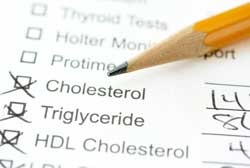Acupuncture and herbal medicine are helpful in the prevention of high cholesterol and high triglycerides. Learn more about this problem and how to avoid it with home measures.
Definition
Hyperlipidemia refers to elevated levels of plasma lipids. This includes cholesterol, cholesterol esters, phospholipids and triglycerides. Lipids are found in blood plasma and are bound to proteins. In this form, they are called lipoproteins. There are several forms of lipoproteins: chylomicrons, very low-density lipoproteins (VLDL), intermediate-density lipoproteins (IDL), low-density lipoproteins (LDL), high-density lipoproteins (HDL). VLDL and LDL levels are considered ‘bad cholesterol’ because they tend to clog arteries whereas HDL is considered ‘good cholesterol’.
Risks for Disease
High cholesterol (hypercholesterolemia) and high triglyceride (hypertriglyceridemia) levels in the blood may lead to atherosclerosis and subsequent increased risk for coronary heart disease. Other diseases associated with hyperlipidemia include pancreatitis, peripheral vascular disease and xanthomatosis (xanthomas are nodules of triglycerides and cholesteryl esters that form in tendons, areas of continued trauma, legs, knees and elbows, as well as the palms). The National Heart, Lung, and Blood Institute (NHLBI) launched the National Cholesterol Education Program (NCEP) in November 1985. The NCEP estimated that each year approximately 1.5 million Americans experience a heart attack (myocardial infarction) and one-third of them do not survive.
Drug Treatments
The four most popular classes of drug used to treat hyperlipidemia are:
- Statins (HMG-CoA reductase inhibitors)
- Bile acid sequestrants
- Nicotinic acid
- Fibric acids
Statins reduce LDL levels up to 55 percent, bile acid sequestrants up to 30 percent, nicotinic acid up to 25 percent and fibric acids up to 20 percent. Statins reduces triglycerides up to 30 percent, bile acid sequestrants do no lower triglycerides, nicotinic acids up to 50 percent and fibric acids up to 50 percent.
Conventional Wisdom
Standard recommendations to address hyperlipidemia are to lower saturated fat to under 7 percent of the diet, increase fiber (cereal grains, beans, peas, legumes, fruits and vegetables), increase plant stanols/sterols (found in fruits, vegetables, nuts, seeds, cereals, legumes, vegetable oils and other plant sources), control weight levels and engage in physical activity.
Stress and Genetics
There are genetic predispositions towards hyperlipidemia. Also, high cholesterol may be a symptom of mental stress, a cause of high cholesterol and a risk factor for heart disease. Therefore, it is not enough to simply lower cholesterol levels to avoid heart disease. The stress levels must be reduced.
General Dietary Considerations
- Shitake and oyster mushrooms. These are helpful in the treatment of hyperlipidemia.
- Nuts tend to reduce LDL and increase HDL.
- Avoid Trans Fatty Acids (partially hydrogenated oils). If you see them on a package label, do not eat the product.
- Caloric intake. Do not overeat.
- Restrict sugar intake. Avoid refined sugar products.
- Eat a wide variety of food. Vitamins C, B6 and B12 help to prevent hyperlipidemia and coronary heart disease. Whole grains, stalk vegetables, and nuts contain manganese and chromium, which can help prevent arteriosclerosis. Iodine can help prevent accumulation of lipids on arterial walls, so eating seaweeds is important. Garlic and onions reduce serum lipids.
- Avoid the center aisles of the supermarkets. Packaged products are the interior of the store and fresh foods are usually found in the periphery. Avoid eating refined foods that are packaged. Fresh foods are better choices.
- The best grains for hyperlipidemia patients are corn, millet, oats, rice and wheat.
- Sea fish are rich in EPA and DHA. DHA has been shown to reduce serum lipids and protect the cardiovascular and nervous systems.
- Eat proteins that are low in saturated fat. Fish, beans and bean products (tofu), poultry, and lean meat are good choices.
- Fresh fruits and vegetables. A component of any healthy diet.
Beneficial Foods for the Prevention of Hyperlipidemia
- Shan Zha / Hawthorne Fruit. Very strong function.
- Go Ji berries, Gou Qi Zi
- Sunflower Seed
- Tomato
- Kiwi Fruit
- Fig
- Walnuts
- Apple
- Cucumber
- Celery. Juiced or raw, 50-100 grams per day is recommended due to its strong function.
- Eggplant
- Daikon Radish
- Carrot
- Garlic
- Shitake Mushroom
- Tofu
- Buckwheat
- Oats
- Corn
- Seaweed
Herbal Medicine
Many herbs including Lai Fu Zi, Shan Zha, Hong Qu Mi, Ze Xie, Dan Shen, Du Zhong, and Jue Ming Zi lower cholesterol and triglycerides. The clinical strength of these herbs is often powerful enough to restore a normal blood lipid balance. In many cases, a customized formula is necessary to match the patient’s exact medical needs. I take a differential diagnosis, determine the body’s imbalance, and then formulate the herbal combination best suited to the individual patient.

